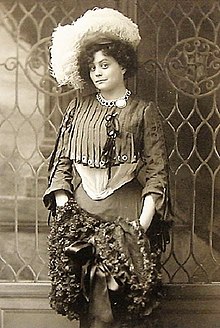This article includes a list of general references, but it lacks sufficient corresponding inline citations. (August 2014) |
Trixie Friganza | |
|---|---|
 Friganza in The Chaperons (1902) | |
| Born | Delia O'Callaghan November 29, 1870 Grenola, Kansas, U.S. |
| Died | February 27, 1955 (aged 84) Flintridge, California, U.S. |
| Resting place | Calvary Cemetery (Los Angeles) |
| Occupation | Actress |
| Years active | 1889–1940 |
| Spouse(s) | “John Doe” (1899–1900) Dr. William J.M. Barry (1901–1911) Charles A. Goettler (1912–1914) |
Trixie Friganza (born Delia O'Callaghan; November 29, 1870 – February 27, 1955) was an American actress. She began her career as an operetta soubrette, working her way from the chorus to starring in musical comedies to having her own feature act on the vaudeville circuit.
She transitioned to film in the early 1920s mostly playing small characters that were quirky and comedic. She retired from the stage in 1940 due to health concerns. She spent her last years teaching drama to young women in a convent school and when she died she left everything to the convent. She became a highly sought after comic actress after the success of The Chaperons (she played "Aramanthe Dedincourt") and is best known for her stage roles of Caroline Vokes (or Vokins?) in The Orchid, Mrs. Radcliffe in The Sweetest Girl in Paris, for multiple roles in The Passing Show of 1912, and her run as a vaudeville headliner. During the height of her career, she used her fame to promote social, civic, and political issues of importance, such as self-love and the Suffragist movement.